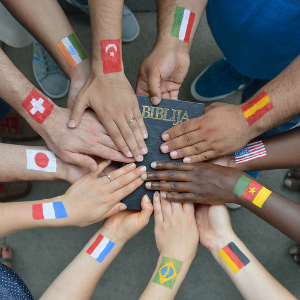Adoption: Ten Course Corrections for Everyone
I am an adoptive parent. I believe in the institution of adoption, and I thank God we have our daughter. That said, I’ve noticed some serious dysfunction with how evangelicals sometimes approach and/or think about adoption, mostly international. It’s time for some course corrections.
1. We should be able to assume that Christians have the highest standards of ethics and justice. If we believe Jesus is the truth, we should be zealous about truth telling. Believers have often been so focused on rescuing that we've bent the rules, justifying our behavior by pointing to the kids’ desperation. Consequently, we’ve hurt our testimony and provided incentives for corruption. We’ve exaggerated the numbers of waiting kids. We’ve participated in systems that told parents they were sending their kids off for education—only later to learn they’d terminated rights. And we’ve been quick to believe a child had no living parents when that was the story we wanted to hear.
2. Birthparents and adoptees need better advocates. The people in the adoption equation with money are usually adoptive parents, not birth parents. Thus, laws are skewed toward adoptive parents’ rights, not birth parents’, and certainly not adoptees. Because of this power differential, we should be on the front lines speaking up for those who can’t speak for themselves—especially the widow and the fatherless (Prov. 31:8; Isa. 1:17).
3. Money corrupts. Anytime we show up with cash in a context of poverty, we bring an incentive for corruption. That is not to say we should stay away. But it does mean we should have many checks and balances in place—including a no-bribe policy. When we go to adopt internationally, we must be patient with governments seeking to verify that a child has no living relatives because of this risk of corruption.
4. It is usually in the best interest of families to keep them together. We should be more focused on keeping families together than we are on rushing kids into the arms of waiting families. In many cases “orphans” have a surviving parent and/or relatives whose only reason for giving up the child is money. The parents will never get over making such a plan for their children; the children never get over knowing their biological family is out there somewhere; and the community loses a member. These traumas haunt people for life. We should look to adoption only as a last resort.
5. We should cry rather than only rejoicing. A child joins a family by adoption because of deep brokenness such as death, poverty, and/or war. And this is where human adoption differs significantly from our spiritual adoption. God created us in the first place. So when we become his children through adoption, we are actually twice his. The separation that has happened between “birthparent” and “adoptee” comes to an end. Thus, spiritual adoption is a picture of redemption and restoration. Not so with human adoption. While it reflects deep unconditional love and choice on the part of the adoptive parent(s), it does not picture restoration. Rather, it is sometimes the best solution in a tragic situation. And we often deny that tragedy.
6. We must stop “caring for orphans” at the expense of widows. Often we wrongly separate the phrase “widows and orphans” into two classes of people when they actually belong together. In many parts of the world, when the husband/father dies, a family gets split up. So our compassionate care for a widow should involve fighting to help her keep her family together rather than guilting her into giving their kid(s) a “better life.” It is bad enough to lose a spouse; but to lose a child because you lost a spouse…and to lose that child only because you are poor—Christians! We must do a better job of caring for the voiceless!
7. We need a more accurate understanding of biblical adoption. We say adoption is a biblical concept, but often there’s a big gap between what we mean by “adoption” and what the biblical writers meant. We point to Moses as Exhibit A, but he is actually an example of a failed adoption. How well did he really bond with Egypt’s royal family? Through his story we see that children never stop identifying with their people—a good reason to keep families together. God used Moses’s tragedy for good, but that does not make what happened to him a beautiful thing. Moses’s separation from his family of origin was a disaster caused by profound evil.
We use Esther as a biblical example of adoption. But Esther was raised by a member of her extended family, and thus had access to other biological family members.
In all the instructions laid out for the people of Israel, everything from guidelines about textiles to medical concerns, not one word is written in the Law about adoption. People dealt with infertility either by resorting to polygamy (e.g., Hannah, 1 Samuel 1) or levirate marriage. And people dealt with absent parents through extended family, as in Esther’s situation.
Before Abraham impregnated Hagar or Sarah, he assumed his nephew Eliezer would inherit his goods (Gen. 15:3). At that time, the whole point of adoption was that a man needed an heir—and he found an adult male if he had no son. The emphasis was on inheritance. It was not about a little child entering a new family and being nurtured as if that child were the parents’ own.
In the intertestament period, Julius Caesar made provision in his will—that is, posthumously—to adopt his great-nephew, Gaius Octavius Thurinus, age 19, known to us as Octavian or Caesar Augustus. This legal pronouncement made Augustus the son and thus the heir. Everyone in the world of Paul and John, the two New Testament writers who spoke of adoption, would have known this.
In the New Testament, Paul writes, “For you did not receive the spirit of slavery leading again to fear, but you received the Spirit of adoption, by whom we cry, ‘Abba, Father.’ The Spirit himself bears witness to our spirit that we are God’s children. And if children, then heirs—namely, heirs of God and also fellow heirs with Christ… (Rom. 8:15–17). Note the contrast with slavery and the connection of adoption with being an heir.
In Galatians 4:4–5, Paul writes, “But when the appropriate time had come, God sent out his Son, born of a woman, born under the law, to redeem those who were under the law, so that we may be adopted as sons with full rights.” Notice the emphasis on rights. The contrast would be with slavery, in which a person had no rights, not even to his or her own body.
Rights and inheritance are secondary when Westerners think of adoption, but they would have been primary in the New Testament writers’ minds.
8. We must stop telling adopted kids how lucky they are. One of my white friends who adopted children from Ethiopia tells me that strangers who talk to her kids in the grocery story tell them how lucky they are. People who view the parents as saving waifs who should be eternally grateful for the gift of parents have it backwards. Yes, children are to honor their parents, but Scripture says “Children are a gift from the Lord” (Ps. 127:3, italics mine). The parents are the ones who should be expressing gratitude. Imagine if Pharaoh’s daughter had told Moses, “You’re lucky you got rescued from those slaves. Here in the palace, you’re rich and you have access to education. Your life is so much better than it would have been. You should be grateful!” Our kids are better served by our grieving with them about their loss as we express our gratitude to God that he has blessed us with them.
9. Nobody should adopt a kid to gain gold stars with God. Nor should they speak of adoption as rescuing, doing good works, or as anything remotely associated with charity. That’s insulting. We would not want anyone to think that way about having a biological child.
10. Children with special needs require a lot of extra love and affection. Let me say that another way: If kids have special needs, they require extra love and attention and services. Parents who keep adopting sixteen more kids when they have already adopted some with special needs should do so only in a context of much accountability and counsel. Because in the same way that some people can’t seem to stop having plastic surgery, some can’t seem to stop looking for babies to adopt. The church and adoption agencies must help them. We have a responsibility both to the parents and the kids in such situations.
As those adopted of God, we have a Father twice-over who accepts this as pure and faultless: that we look after orphans and widows in their distress and keep ourselves from being unstained by the world. Part of the widows’ and orphans’ distress is the pain of separation. May we do a better job of looking after them.




One Comment
SonShine
Adoption
Excellent reminders especially as we sit in church being bombarded with guilt trips about "why" we have not …and especially to our senior adults who are way too old to adopt and raise a child with abundant energy etc. it was in my mind a travesty and so unnecessary.